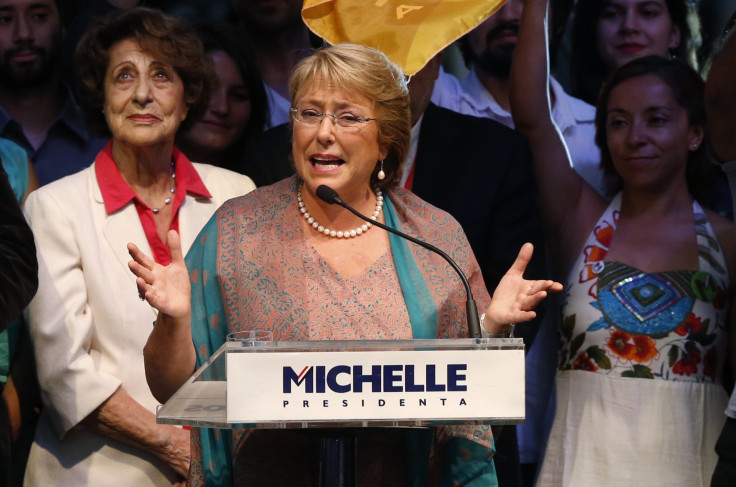Michelle Bachelet Wins Chile Presidency In Landslide

Michelle Bachelet was elected as president of Chile again on Sunday in a landslide victory.
She won the runoff election after promising drastic changes to the nation's society in response to years of street protests, USA Today reported. With 90 percent of the votes counted, Bachelet took an unbeatable 62 percent to the 38 percent that center-right candidate Evelyn Matthei -- who conceded defeat -- had won. It was the biggest proportion of votes anyone running for president in the Andean country has received since the country began having democratic elections again in 1989, and the right's poorest showing in 20 years, according to Reuters.
The center-left Bachelet -- a physician by training who led Chile between 2006 and 2010 as its first female leader -- is a moderate socialist and has promised 50 reforms in her first 100 days, according to Reuters. Her centerpiece policy is a hike in corporate taxes to 25 percent from 20 percent, to pay for social reforms that include a gradual move to free higher education.
Bachelet returned to Chile earlier this year to run for the presidency after heading the United Nations' gender equality body, U.N. Women, Reuters noted. And, it is expected that Bachelet, who will take office in March, will look to make changes aimed at redressing ongoing inequality in the world's top copper exporter.
Bachelet's politics are significantly different from the hard-left radicalism that has shaped Venezuela and Argentina in recent years, and are closer to the business-embracing direction taken by Brazil's president, Dilma Rousseff.
She also adhered to the fiscal prudence that's characterized the economy of Chile in recent decades.
"There are two things we know that don't change in Chile," said political scientist Patricio Navia. "One is that we always have earthquakes. And the other is that since 1990 governments are fiscally responsible. That goes without question."
In the last two decades, Chile's free-market economy and copper-fueled growth have made the country a success story. But there is still plenty of social division in Chile; in Santiago's upscale Las Condes district, for example, Bachelet received just 24 percent of the vote.
A single mother who was a torture victim during dictator Augusto Pinochet's rule of Chile, Bachelet is considered a "people's candidate."
"This triumph is a small step towards the changes that are coming to Chile," said education student Beatriz Jorquera, 19, within a crowd outside La Moneda, Reuters reported.
© Copyright IBTimes 2024. All rights reserved.











